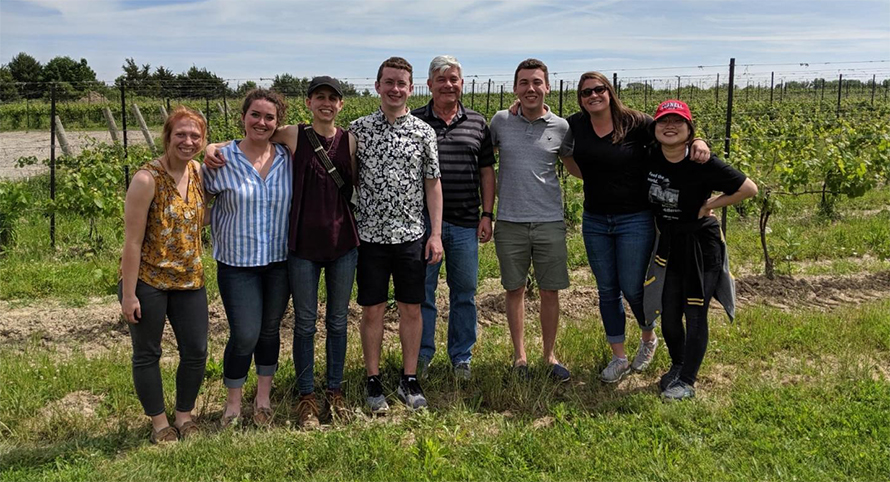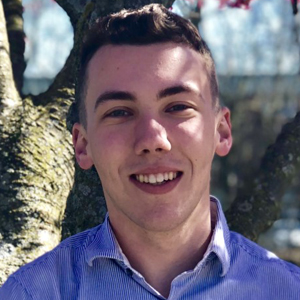To stay productive, ask for help
Starting graduate school during a pandemic has presented some challenges, including scheduling lab time, traveling to and from classes in person and virtually, and lack of access to buildings. I joined the plant pathology and plant microbe biology Ph.D. program at Cornell University this fall. My university has tightened restrictions on using public spaces unless absolutely necessary — forcing students like myself to stay in our apartments most days. Living off campus, I sometimes feel disconnected from lab culture and the grad school experience.
What have universities been doing to combat the antagonists of student well-being? COVID-19 is challenging mental and physical health around the globe, and most grad students are under more stress than we have encountered in our whole lives. The short answer is that the resources are on campus; it's up to students to find and use them at our respective schools and take control of our wellness. In my program, the university urges us to use these resources without restraint and take care of ourselves to ensure success.
It took time to find all the resources I needed. I reached out to mindfulness groups, clubs and counseling services that would support me during graduate school. Asking was difficult. Knowing my mental state was difficult. Establishing my support system got easier over time, and it was one of the best decisions I made entering this program. Here are the people that I depend on in grad school.
Ask your PI
It may be unusual that I can share struggles, successes and everything in between with my advisor since I just entered into this program. Graduate school is a time full of obstacles, frustration and chaos — all for the purpose of learning how to be a better scientist. Having someone to talk to and act as a mentor through this is critical to success. Others within my cohort have similar relationships with their PIs, but I know some grad students who have strictly professional relationships with their mentors. No matter what boundaries are in place, I believe that attempting a heartfelt conversation with your boss about COVID-19 and well-being is warranted.
To the extent that my PI knows I'm struggling, they have been able to help me through or guide me to the right resources. I was nervous when I started this conversation, but I was reassured by the end that I had picked the right advisor for me — and if I'd had any concerns, I would have taken them to the head of the department.
Other professors at my university have offered students time to talk if we need it. In October, I tweeted about my struggles feeling distant from home, and several professors reached out to me, saying they were here to talk if I needed it. This meant the world to me, and it made me feel supported in my education. I wish all grad students could experience this type of environment. I understand this is not always the case, but there are always caring individuals on the administrative staff or elsewhere within the department, so search them out.
Two people in my cohort had their fellowship funding delayed, causing financial and emotional stress. Their respective PIs, once they became aware of this, showed great compassion — offering money for food or gas until the paycheck came and blasting the finance department via Twitter and email. This was a simple mix-up in another department, but it showed the compelling empathy of my cohort's advisors. The unity of my department was showcased through this mishap.

Ask your lab mates
All of us in the lab, postdocs and grad students, experience the same stressors day to day. While balancing classes, seminars, conference abstracts and lab meetings, we lean on each other for support and share our concerns. Talking with others in my lab has helped me to feel less isolated in my feelings of self-doubt and anxiety. I know that I am not alone in my struggles, thanks to the people around me — it's okay to be vulnerable with them.
We share the same failed experiments, the months spent trying to figure out a bioinformatics program, or the seemingly endless time spent trying to produce a worthy result. After commiserating with my lab mates about our collective problems, I have a sense of bonding that helps me overcome the obstacles. It boosts my morale and helps me keep going.
Ask professionals
Every university and college has at least one licensed psychiatrist. My university has several dozen. After an initial evaluation, you have opportunities to continue one-on-one counseling or venture into group sessions since students often face parallel problems during graduate school. Group session topics at my university include mindfulness, procrastination, anxiety, imposter syndrome, depression and unpacking our complex feelings about COVID-19. Counseling professionals lead these sessions via Zoom. It may not be quite the same as in person, but it is nearly the same relieving outcome. I have taken advantage of plenty of mindfulness sessions, and I did this when I was an undergrad too. The online format just makes participating that much easier, with no hustling around campus required.
Our campus health centers are keen to provide information about resources to all students. They send email reminders on topics such as building a routine for productivity or getting out of a depressed state. I've benefited from mindfulness practices during my most stressful times. I use the Koru Mindfulness App to keep it a habit. This program is targeted toward young adults and academics. Finding what worked for me personally took some navigating; it's important to try different avenues.
Ask family or friends
My family and old friends might not understand what I do every day or see the biggest issues in my life, but they provide a more holistic view of the world. I rely on my friends and family, and I support them in the same way with their struggles during this time. Sometimes when I get home from lab and I don't want to talk about the specifics of the day, I call my mom just to hear how my family and dog are. It brings a balance to my life as a scientist, because our work is important — but it's not everything.
I put family and friends as the last point because they aren't counselors, colleagues or mentors; these are give-and-take relationships. I eventually realized that the people closest to me would prefer to hear fewer rants about how difficult lab was and more about the optimistic side of each day. This positive perspective took shape over time, and these cheerful relationships are essential to my overall well-being. It helps me to have that same attitude toward my friends and family that they show to me.
We are all dealing with COVID-19 in our own ways. Some days I hit the ground running while others my feet drag behind me. But I am learning how to be a better student by taking care of myself and trusting the people around me.
Enjoy reading ASBMB Today?
Become a member to receive the print edition four times a year and the digital edition monthly.
Learn moreGet the latest from ASBMB Today
Enter your email address, and we’ll send you a weekly email with recent articles, interviews and more.
Latest in Opinions
Opinions highlights or most popular articles

Women’s health cannot leave rare diseases behind
A physician living with lymphangioleiomyomatosis and a basic scientist explain why patient-driven, trial-ready research is essential to turning momentum into meaningful progress.

Making my spicy brain work for me
Researcher Reid Blanchett reflects on her journey navigating mental health struggles through graduate school. She found a new path in bioinformatics, proving that science can be flexible, forgiving and full of second chances.

The tortoise wins: How slowing down saved my Ph.D.
Graduate student Amy Bounds reflects on how slowing down in the lab not only improved her relationship with work but also made her a more productive scientist.

How pediatric cataracts shaped my scientific journey
Undergraduate student Grace Jones shares how she transformed her childhood cataract diagnosis into a scientific purpose. She explores how biochemistry can bring a clearer vision to others, and how personal history can shape discovery.

Debugging my code and teaching with ChatGPT
AI tools like ChatGPT have changed the way an assistant professor teaches and does research. But, he asserts that real growth still comes from struggle, and educators must help students use AI wisely — as scaffolds, not shortcuts.

AI in the lab: The power of smarter questions
An assistant professor discusses AI's evolution from a buzzword to a trusted research partner. It helps streamline reviews, troubleshoot code, save time and spark ideas, but its success relies on combining AI with expertise and critical thinking.

